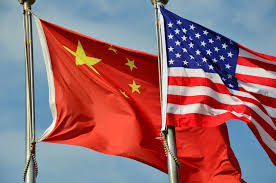Stock markets around the world plunged for a second day on Friday as China announced retaliatory tariffs of 34% on US imports, signalling a major escalation of a trade war ignited by Donald Trump and feeding fears of a global recession.
“For all imported goods originating from the US, an additional tariff of 34% on top of the current applicable tariff rate will be imposed,” Beijing’s finance ministry said.
China’s commerce ministry said that it would also impose more restrictions on the export of rare earths, which are used in hi-tech manufacturing such as batteries and electric vehicles. It added a further 16 US companies and organizations to its export control list, meaning that Chinese companies are restricted from doing business with them.
China had previously promised “resolute countermeasures” against Trump’s tariffs, which slapped a 10% rate on all imports coming to the US, with extra levies for certain countries, including China.
China’s state council tariff commission said: “On April 2, 2025, the US government announced the imposition of ‘reciprocal tariffs’ on Chinese goods exported to the US. This practice of the US is not in line with international trade rules, seriously undermines China’s legitimate rights and interests, and is a typical unilateral bullying practice.”
However other analysts said that China’s response was forceful.
Stephane Ekolo, a market and equity strategist for Tradition in London, told Reuters: “China comes out swinging with an aggressive response to Trump’s tariffs. This is significant and is unlikely to be over, hence the negative market reactions. Investors are afraid of a ‘tit for tat’ trade war situation.”
Some analysts had expected the US and China to reach a deal before the 9 April deadline for the US’s tariffs to take effect. The Financial Times had reported that Trump was considering using the threat of tariffs to pressure Beijing into allowing ByteDance to sell off TikTok to a US entity.
Shameen Prashantham, a professor at the China Europe International Business School in Shanghai, said the mounting trade war was a body blow to global trade. “I just can’t see how there are going to be many winners in this,” Prashantham said.
China’s industry associations have unanimously condemned the tariffs. China’s National Textile and Apparel Council said that it “supported the government’s forceful measures” and that the US had “damaged the resilience of the global textile industry’s supply chain”.
Chinese fast fashion companies are expected to be particularly badly hit by the new tariffs. Temu and Shein have grown to dominate the e-commerce industry in the US thanks to a loophole in the US’s import rules, which allowed goods valued at less than $800 to be shipped to the US for free. Trump has now closed that loophole, effective from 2 May.
About 60% of duty-free packages coming into the US come from China. But those deliveries will, from May, be subject to a fee of 30% of the value of the goods, or $25, rising to $50 in June.
Temu and Shein have yet to comment.
China has also filed a lawsuit against the US with the World Trade Organization.
Source: Websites




